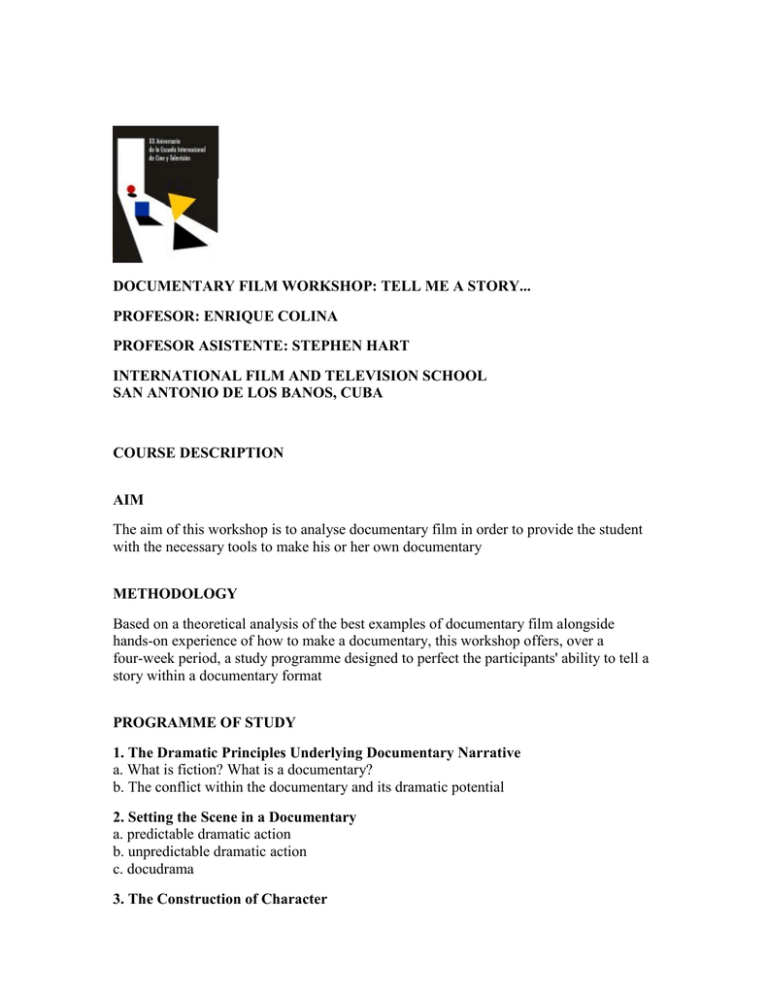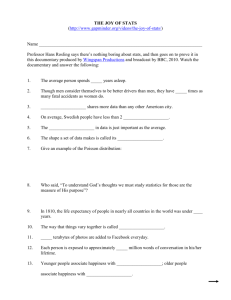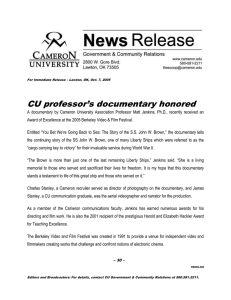DOCUMENTARY FILM WORKSHOP: TELL ME A STORY... PROFESOR: ENRIQUE COLINA
advertisement

DOCUMENTARY FILM WORKSHOP: TELL ME A STORY... PROFESOR: ENRIQUE COLINA PROFESOR ASISTENTE: STEPHEN HART INTERNATIONAL FILM AND TELEVISION SCHOOL SAN ANTONIO DE LOS BANOS, CUBA COURSE DESCRIPTION AIM The aim of this workshop is to analyse documentary film in order to provide the student with the necessary tools to make his or her own documentary METHODOLOGY Based on a theoretical analysis of the best examples of documentary film alongside hands-on experience of how to make a documentary, this workshop offers, over a four-week period, a study programme designed to perfect the participants' ability to tell a story within a documentary format PROGRAMME OF STUDY 1. The Dramatic Principles Underlying Documentary Narrative a. What is fiction? What is a documentary? b. The conflict within the documentary and its dramatic potential 2. Setting the Scene in a Documentary a. predictable dramatic action b. unpredictable dramatic action c. docudrama 3. The Construction of Character a. The character tells his story b. The character acts c. Other individuals talk about the character d. An omniscient narrator presents the character off-screen and comments on his story e. The choral character f. The director as a dramatic character, as an observer who is present, or as the "transparent, neutral and objective" director g. The character and his environment: dramatic location 4. Narrative Structures a. Organisation of the event in temporal terms b. The chronological approach c. Re-structuring time d. Lack of temporal structure e. Structuring the narrative via association based on logic or an underlying concept, by gradually adding new elements, or via a spiralling structure f. Ideological montage and the use of a metaphorical idiom in documentary film 5. Documentary Genres and Styles a. The shaping of information within the documentary b. Journalism and the artistic documentary c. The observation-based documentary: Direct Film, Free Cinema, cinema verite d. The documentary built around a conceptual thesis e. The documentary as propaganda 6. Ethical Conflict and Documentary Praxis a. Expressive modes and the manipulation of the spectator's emotions b. Emotion, irony, ambiguity 7. Construction and Style of Communicational Devices a. The interview b. Graphics c. The narrator d. The use of archive material 8. The Various Steps of Production a. The idea and the artistic hypothesis b. Research: the tactical documentary filmmaker c. The Synopsis: how to deal with funding and how to look for funding d. The documentary with or without a script e. The shooting schedule f. Postproduction Weeks 1-2 Practical Exercises on How to Tell Stories Hands-on exercises carried out individually a. This is what I'm like... b. That person over there is like that.. c. This is what this place is like... d. This event took place here... e. I think the following about this issue.. Weeks 3-4 Team-based Projects f. Project implemented by a team and built around a pre-selected theme Schedule a. Classes in the morning from 9 am until 1 pm b. Hands-on filming projects in the afternoon c. On Saturdays and Sundays there will be more wide-ranging hands-on filming projects Technical support Students who have their own cameras and laptops with editing facilities will be able to use their own equipment for the individual-based, hands-on projects (weeks 1 and 2). The Film School will provide digital cameras, editing suites, and a full film crew (producer, editor, cameraman, sound technician, lights technician, including advisors) for the team-based filming project (weeks 3-4). Transport to approved shooting locations will also be provided.




